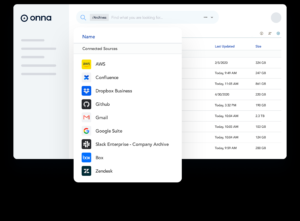
Onna Takes a Platform Approach to Knowledge Integration

(ra2 studio/Shutterstock)
If you work for the average company, you access information via nearly 90 different applications, according to a recent report. Good luck finding what you need. One way to increase the odds of finding the information you need is an emerging class of products called knowledge integration platforms, such as the one that Onna provides.
The expansion of cloud- and SaaS-based apps creates opportunities and challenges, says Kelly Griswold, chief strategy officer at Onna, a knowledge integration platform startup based in New York City and Barcelona, Spain.
“In many ways, being able to leverage best-of-breed apps is increasing productivity for the teams that are using them,” Griswold says. “But in other ways, it’s creating a data fragmentation challenge, so you really need a knowledge integration platform to help you navigate across all of these different applications to make sure that proprietary knowledge inside an enterprise is accessible, private, and secure. And that’s what we’re doing.”
Onna was founded in 2015 by Salim Elkhou, its current CEO, as a way to unite unstructured data residing in disparate applications, such as Slack, Dropbox, Gmail, Salesforce, Office 365, Zendesk, Drive, Confluence, and others. While data warehouses provide a place for uniting and accessing structured data, Elkhou sought a way to let people unite and access the unstructured data that is created and stored in a multitude of apps (although Onna works with structured data too).
Onna’s offering, which is available in cloud and on-prem versions, automatically synchs with a multitude of data repositories used in modern enterprises. As it imports copies of customers’ data, it indexes and categorizes that data using machine learning and natural language processing (NLP) algorithms. It then allows users to search across that unified data repository, and also to build apps atop it using Onna’s API.
There are several use cases for Onna’s KIP. For starters, it can function as an archive for all of the data sources it integrates with (which currently numbers more than 20, per Onna’s website). Thanks to its ML capabilities, Onna can automatically identify personally identifiable information (PII), which means it can be used to help comply with data privacy regulations like GDPR and CCPA. The software can be used for e-discovery too.
There are both horizontal and vertical use cases for Onna, Griswold says. “The ones that we’re seeing most demand for right now are typically falling in the legal, compliance, and security spaces, as well as general information governance and knowledge management, which ties into the more horizontal applications and search,” she says.
Onna competes with some strong incumbents in the enterprise search space. But there is still room in the space because of the continued growth in data silos, as evidenced by Okta’s “2020 Business at Work” report, which found the average worker uses 88 apps, up 6% in a year.
“A McKinsey study a couple of years ago highlighted that knowledge-based workers are typically spending about 20% of their time searching for information,” Griswold says. “They qualified it as a hundreds-of-billions-of-dollars opportunity for businesses, just by improving productivity with better access to information. That’s a major value driver.”
Another emerging driver is COVID-19, which has disrupted office life for millions of information workers and helped to accelerate the migration to cloud and SaaS apps. The pandemic has forced employees to adopt new workflows. For example, you can’t use the office Xerox machine anymore.
This shift to SaaS and cloud apps exacerbates the data silo problem and raises the risks associated with emerging data privacy regulations, like CCPA and GDPR, which is right in Onna’s wheelhouse. The company hopes to be a supporting agent during this period.
“We’re seeing that this is a time of extreme change management, but that can also create opportunities to use tools more efficiently and [improve] process through automation,” Griswold tells Datanami. “We’re seeing those two trends combine right now as it comes to how companies are adapting to the environment, and the challenge and opportunities that it creates.”
Onna recently completed a Series B round of financing worth $27 million, giving it $43 million in total investment. Among the company’s existing investors are Drop and Slack, which are firms that Onna’s KIP connects to.
But Onna has its eyes on something bigger than being just another enterprise search engine. Since it’s ingesting much of the source data, categorizing it, and exposing it via its own API, it’s bullish on the prospect of its customers (or perhaps partners) building new apps atop Onna’s KIP.
“Knowledge integration platform is a new category that we think will be more recognized and common over the coming years,” Oswald says. “Once we’re in a client’s IP infrastructure and we’re connected to different sources and we’re maintaining that real-time synch, you can actually come in and apply different classifications, and ostensibly you could mine that information to create and identify new areas of efficiencies.”
Related Items:
To Centralize or Not to Centralize Your Data–That Is the Question
Three Privacy Enhancing Techniques That Can Bolster the COVID-19 Response

































